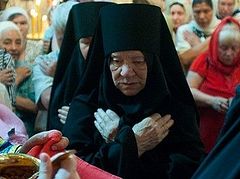
When people are suffering in their lives with things like divorce or other losses‚ financial stress‚ aging or illness; the sudden onset of pre-Christmas cheeriness may leave them feeling even more isolated and deprived‚ because the rest of world is portrayed as happy and fulfilled in stark contrast to how they feel.
Others who do embrace pre-holiday celebrations often feel let down and weighed down by food and debt shortly after Christmas day. The novelty of the new material things wears off quickly‚ friends and family go home‚ and people may be left feeling blue. This is the feeling known as post-Christmas let-down.
The Orthodox way of celebrating Christmas can yield completely different results.
The Nativity Fast Addresses Pain as Well as Pleasure
“The birth of Christ brought joy and hope to those who had been in darkness and the way the Orthodox celebrate Christmas is designed to let people feel that hope again‚” states Father Jonathan Ivanoff‚ an Orthodox Christian Priest and Pastor of St. John the Theologian Orthodox Church in Shirley‚ New York.
The Orthodox Church teaches that Advent represents the time before Christ‚ when God’s people were lost and disconnected from God. Experiencing this loss and disconnection in some way is seen as a necessary pre-requisite to embracing the joy of Christ’s birth in its fullness.
To achieve this‚ instead of “pre-celebrating” the Christmas holiday during Advent‚ Orthodox Christians participate in a solemn‚ six-week fast during this time.
What is the Nativity Fast?
Those who are fasting eat less and avoid all meat‚ cheese‚ eggs‚ fish and wine on most days. They keep a primarily vegetarian diet. The faithful do not get caught up in the “letter of the law” and do not freak out if they have to have a piece of meat. The spirit of the practice is more important than what is eaten. There is no threat of eternal damnation.
In place of food‚ drink and partying during Advent‚ the Orthodox are asked to nourish their souls with increased prayer‚ communion with their fellow parishioners‚ and drawing closer to God. For those who are struggling with personal problems‚ this period can give them a spiritual boost. Their brothers and sisters are experiencing the somber reality of the human condition with them‚ through the fast. They are not alone.
According to Fr. Ivanoff‚ Christmas parties are put off until Christmas day when the fast is finally broken. The “famine” ends and the celebration begins. In fact‚the Orthodox continue to celebrate for 10 days after Christmas.
The Spirit of the Fast
Participating in the fast helps people tame their worldly appetites. It is an exercise in transcending the body and not being ruled by impulses. People who are fasting begin to feel that regardless of their worldly limitations or deprivations‚ they have a connection to God that sustains them through the fast and always.
In addition to increased prayer‚ almsgiving is expected to increase during the Nativity fast. According to Fr. Ivanoff‚ this means‚ specifically‚ giving money to relieve poverty and material need. Doing this offers a counterbalance to people’s urges to overspend on material goods during Christmas. It brings people in contact with others who are far worse off financially‚ quelling feelings of wanting more than they already have.
Feeding the Soul
These acts of almsgiving can restore feelings of connection with fellow human beings and even with our greater purpose. It reminds people that life means more than the consumption of material goods. It helps people out of the rut of day-to-day life.
If people stick to the fast‚ they will find themselves feeling more somber. A certain mental clarity can dawn. They may have even shed excess pounds. They can feel much more in control of themselves and their appetites‚ and therefore more hopeful. They may feel closer to God and have more love and compassion towards others.
Breaking the Fast
Towards the end of the fast‚ people feel like they have accomplished something difficult. On Christmas day they break the fast‚ exit the period of darkness and celebrate the birth of Christ. The feast is that much sweeter because of the famine that preceded it‚ just as a drink of water is most meaningful when one is very thirsty.
Because those observing the fast have done the work of nourishing the soul they are now ready to give and receive the God-given blessings of food‚ drink‚ material things‚ family‚ friends and fun. Orthodox Christians believe that God wants people to be joyful in this world. The world is a gift.
Even those who are still afflicted‚ having had their souls filled‚ may feel comforted and‚ in spite of their situation‚ May experience the joy and hope that tends to come after breaking the fast. They May feel a renewed connection with God and others.
Orthodox Christmas Trees
Orthodox Christians tend to put up their Christmas trees later—some don’t do it until Christmas Eve—and to keep them up longer. Even as the joy of new “toys” wears off‚ and family and friends go home‚ the joy of Christ’s birth continues to lift them up because they have felt this renewed connection to God and others through the fast. The hard work is behind them and they are living in the light of Christ’s birth.
Just as a little baby in a manger offered hope to the world‚ Christians are called to follow in His footsteps and to be like lights in their worlds. No person is too flawed or too ordinary to make a difference‚ according to Orthodox teaching. Each person is called by God in his or her own way‚ to do the Lord’s work. Spiritual efforts like the Advent fast may be a form of training for‚ and part of the manifestation of this.
* * *
Authors note: I grew up in a Christian household. My family celebrated Christmas with gifts‚ food and family but no meaningful (to me) spiritual practice. When I was 11 or 1’ years old‚ I remember feeling depressed on Christmas Day. While I loved receiving many gifts and having new things‚ I had learned that the joy in that wore off very quickly‚ and I felt a sense of meaninglessness about the holiday and emptiness inside.
I remember vividly when I spoke to my mother about this problem. She knew right away what I was talking about and told me that I was experiencing the “post-Christmas let down.” I was shocked to learn there was a name for it‚because if other people felt that way too‚ I couldn’t understand why no one was talking about it or trying to fix it!
As I grew older‚ I constantly heard people lamenting how let down they felt days after Christmas‚ but people just seemed to accept it. I couldn’t. Years later I converted to Orthodox Christianity. When I participated in the Advent fast for the first time‚ my past negative experience with Christmas was turned on its head. I knew I would never be subject to post-holiday blues again.
I realize that many people have Christmas spiritual traditions that they value and my personal experience is not universal. But as a mental health professional‚ I can’t help but marvel at the complete grasp of the needs of the human soul and psyche‚ that informs the spiritual practice of pre-holiday fasting in the Orthodox Church.
While I wrote this article from more of an analytical point of view of why this spiritual practice can be so helpful to many‚ it is personal too. Lisa C. DeLuca
* * *
This article was originally published online November 20‚ 2008, and reproduced here with permission from the author.
Copyright Lisa C. DeLuca‚ 2008. All rights reserved. For reprints please visit www. LisaCDeLuca.com/contact/ and follow the instructions for reprint requests. www.LisaCDeLuca.com | Psychotherapist‚ social worker‚ writer
Please visit Our Shared Humanity, a collection of stories about human interactions that affect the soul.




